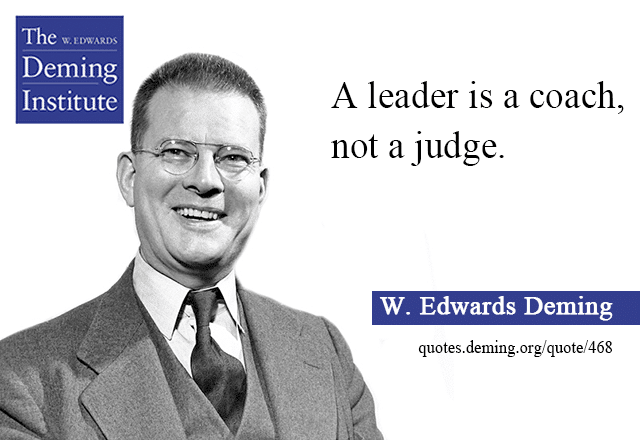By John Hunter, founder of CuriousCat.com.
Point 7 in Dr. Deming’s 14 obligations of management:
Institute leadership (see point 12 and Chapter 8 in Out of the Crisis). The aim of supervision should be to help people and machines and gadgets to do a better job. Supervision of management is in need of overhaul, as well as supervision of production workers.
The phrase “institute leadership” is difficult to understand without context. But Dr. Deming provided context. Point 12 addresses the need to create management systems that provide people joy and pride in work. And he specifically mentions the need to abolish the annual performance appraisal.

For Deming, instituting leadership meant creating management systems that allowed people to take pride in their work and was consistent with the principles he expressed (understanding the organization as a system, understanding variation, etc.). That system allows the organization to be successful by providing for the needs of the employees, delighting customers and meeting the needs of other stakeholders. This system had to be led with an understanding of the interactions between the interrelated compenents.
The title of chapter 5 of the New Economics is Leadership. From that chapter, page 116
As I use the term here, the job of a leader is to accomplish transformation of his organization. He possesses knowledge, personality, and persuasive power (chapter 6 [Management of People]).
How may he accomplish transformation? First, he has theory. He understands why the transformation would bring gains to his organization and to all the people that his organization deals with. Second, he feels compelled to accomplish transformation as an obligation to himself and to his organization. Third, he is a practical man. He has a plan, step by step, and can explain it in simple terms.
But what is in his own head is not enough. He must convince and change enough people in power to make it happen. He possesses persuasive power. He understands people.
See more of my thoughts related to that quote in our previous post: Dr. Deming on Leadership. That post includes another important quote:
The aim of leadership should be to improve the performance of man and machine, to improve quality, to increase output, and simultaneously to bring pride of workmanship to people. Put in a negative way, the aim of leadership is not merely to find and record failures of men, but to remove the causes of failure: to help people to do a better job with less effort.
Actually, most of this book is involved with leadership. Nearly every page heretofore and hereafter states a principles of good leadership of man and machine or shows an example of good or bad leadership.
As you can see, Institute Leadership, for W. Edwards Deming had a very specific meaning. That meaning was directly connected to leading the transformation of the management system into one designed to: let people contribute to their full potential, to delight customers using an understanding of variation (how to use data to improve and how to avoid being misled by data), operate with an understand of process thinking and viewing the organization as a system while always focused on continually improving.
Support of top management is not sufficient. It is not enough that top management commit themselves for life to quality and productivity. They must know what it is that they are committed to — that is, what they must do. These obligations can not be delegated. Support is not enough: action is required.
– W. Edwards Deming, page 21, Out of the Crisis
Related: Tyranny of the Prevailing Style of Management – Dr. Deming on Leadership and Management of People – Deming Library Video with Dr. Deming Discussing the 14 Points


